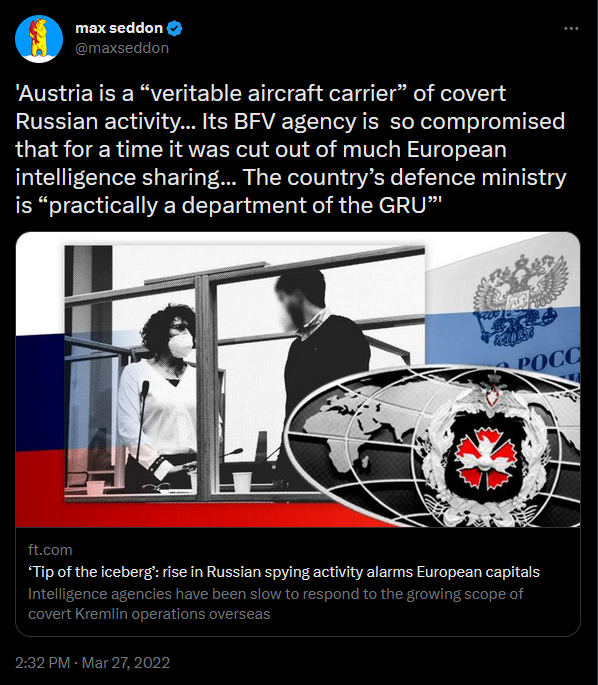
In today's #vatnik soup I'm going to talk about Austria. Countries like Serbia and Hungary often pop up in conversations about Russia and Putin apologists, but when it comes to Russian espionage and intelligence activities, Austria, along with Belgium, comes on top.
1/17
1/17

In the 1950s Austria changed their laws so, that espionage is only a crime when its directed against Austria. This combined with the fact Austria has several prominent NGO's and international organizations makes it an attractive destination for all kinds espionage.
2/17
2/17

For example, Vienna is home to the OSCE, the Organization for Security and Co-operative in Europe and has one of the headquarters of the UN.
Founder of the Austrian Center for Intelligence, Propaganda and Security Studies, Siegfried Beer has said that in Austria...
3/17
Founder of the Austrian Center for Intelligence, Propaganda and Security Studies, Siegfried Beer has said that in Austria...
3/17

... "Espionage was a business. It still is. It brings a lot of people with a lot of money and a lot of support into the country."
He has estimated that there are around 7000 spies who masquerade as diplomats in Austria.
4/17
He has estimated that there are around 7000 spies who masquerade as diplomats in Austria.
4/17

Austria was also the first European country to import Soviet gas and after 1968 it became a large hub for delivering gas to Italy, Germany and France. Before the 2022 invasion, 80% of Austria's natural gas came from Russia.
5/17
5/17

This made the Austrian energy sector deeply entwined and dependent on Russia, and at the end of 2021 Russian companies had assets worth of 25,5 billion USD in Austria. Russia was actually the second largest investor in Austria, right after Germany.
6/17
6/17

Austria was the first Western country to allow Putin to come for a visit after the 2014 annexation of Crimea. Russia has also influenced Austrian politics, especially with the national-conservative Freedom Party. Like in Germany, several high-ranking Austrian politicians...
7/17
7/17

...& officials have moved to Russian business world, including former chancellors Wolfgang Schüssel (board member at Lukoil) & Christian Kern (board member at Russian Railways).Former Austrian foreign minister Karin Kneissl works for Rosneft and in writes a column for the RT.8/17 





This relationship with Russia has strained relations with other EU countries, and this has decreased the trust of their European partners towards the Austrian intelligence services and the defense ministry.
9/17
9/17
One anonymous source called the latter as "practically a department of the GRU". As a consequence, British MI5 and the Dutch intelligence agency have heavily reduced information sharing with Austria's intelligence services and defense ministry.
10/17
10/17

In 2018, an investigation revealed that an Austrian colonel had spied for Russia since the 90s. BBC described the case as a "particular embarrassment to Austria". In 2020, a retired Austrian military man was sentenced to 3 years in prison for spying for Russia.
11/17
11/17

Probably the most famous case of espionage in Austria is the case of Egisto Ott. Ott is a former intelligence officer suspected of selling state secrets to the Russians as well as providing intelligence on anti-Kremlin individuals in the West.
12/17
12/17

CIA warned Austrian authorities about Ott already back in 2017. He was eventually transferred to a police academy, where he requested hundreds of illegal searches on various actors, including Christo Grozev (@christogrozev) of Bellingcat.
13/17
13/17

In 2021, Austrian diplomat Johannes Peterlik allegedly leaked confidential documents about the Skripali poisonings. He's suspected of giving these documents to a former Austrian secret agent accused for spying on behalf of Russia.
14/17

14/17


Austria's banking system is also closely tied to Russia, and Austria's second biggest bank, Raiffeisen Bank International made 35% of its 2021 profits in Russia. Raiffeisen Bank is still one of the few European banks operating as usual in Russia.
15/17

15/17


Austrian police forces came under harsh criticism in May, 2022, after they removed pro-Ukrainian, flag-wearing demonstrators from a pro-Russian rally. The pro-Russian crowd was allowed to continue their chants of support for president Putin.
16/17

16/17


After the invasion of Ukraine and the massacre in Bucha, Austrian Chancellor Karl Nehammer was the first European leader to visit Putin. He described the discussions as "very direct, open and tough". After Bucha, Austria finally expelled four Russian diplomats.
17/17
17/17

• • •
Missing some Tweet in this thread? You can try to
force a refresh






















